Review: Sophia Loren returns with "The Life Ahead"
 Friday, November 13, 2020 at 4:36PM
Friday, November 13, 2020 at 4:36PM 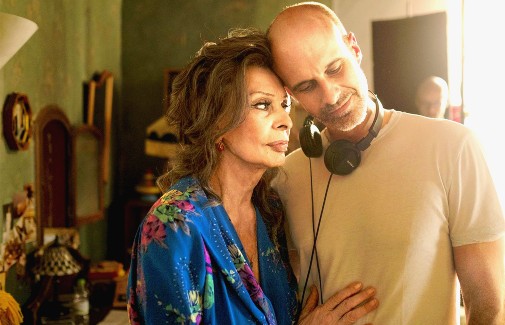 The Movie Star and Her Director Son
The Movie Star and Her Director Son
Even before we see her face in The Life Ahead, it's impossible to draw the eyes away from Sophia Loren. Following in the tradition of European realism, Edoardo Ponti's camera captures an Italian marketplace with shaky energy. However, no matter how shabby the framing might be, the colors depart from the standards of realism. Angus Hudson's cinematography makes everything a bit too bright, the sun shining on the streets like golden flames, every saturated color intensified. It's reality as if painted with crayons by an enthusiastic child.
In this sunny landscape, a shot of bright blue, bluer than the sky, stands out, crowned by a mess of gunmetal hair. Dressed in azure, Loren may have lost some of the youthful glow of her heyday in the midcentury, but the star power is intact, her magnetism as strong as ever. Furthermore, the director, her son, knows how to pay reverence to the screen legend without making it too obvious or too elegiac…
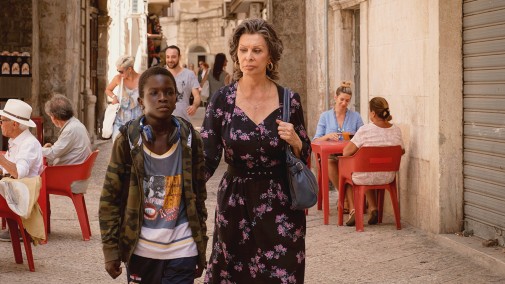
In this remake of the Oscar-winning Madame Rosa (1977), Sophia Loren plays that once eponymous character. Rosa is an aged prostitute, a stern woman who takes care of children in her community, especially those born to sex workers. From whore to Madonna, a Mary Magdalene turned Virgin Mary, Madame Rosa has earned the respect of those around her and she doesn't take too kindly to disrespect. In many ways, her fame precedes her, allowing her to feel mightier than her frail body and aging mind permit.
All this talk about Rosa can lead one to think this is her story. The Life Ahead is essentially a vehicle for Loren, but its narrative, which transplants a 1975 French novel by Romain Gary to contemporary Italy, centers on another person. This is the story of Momo, a 12-ear-old Senegalese orphan. He's been left in the care of a kindly doctor, and the man asks Rosa to take care of the boy for a couple of months in the Summer. At the start, neither the tween nor the old woman is thrilled by the prospect of living together. You can guess where this is going. As the weeks fly by, Momo and Rosa learn to live together, both finding a needed companion.
The Life Ahead is a very conventional tear-jerker, its tale of blossoming intergenerational friendship a trite model that's been filmed many times before. Nonetheless, there are some twists to the oft-told story. The conflict isn't that of a curmudgeon relearning to enjoy life from a gleeful youth, neither is it the smooth coming-of-age narrative one might expect. Instead, we have an exploration of trauma, shared pain as that which brings a society's marginalized together, a hug of barbed wire.
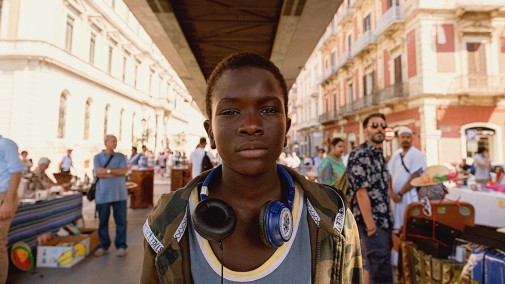
The way the filmmakers explore these themes isn't always praise-worthy. For starters, there's too much needless narration from Momo, and the addition of a metaphorical lioness is a schmaltzy mess of unconvincing CGI. It's all rather perfunctory prestige movie-making of the most disappointing variety. What saves The Life Ahead are, as expected, its actors and that refers to more than Loren's luminous screen presence.
Because our vision of Rosa is so necessarily skewed by Momo's perception, it's Ibrahima Gueye who holds the film together as its protagonist. The first-time actor plays the Senegalese youth with admirable emotional dexterity, suggesting the cries for help hidden in aggressive posturing, the river of sadness running beneath mountains of anger, the affection that covers its face with indifference. Better still, his chemistry with Loren is the stuff movie dreams are made of. When the two share the screen, The Life Ahead is a worthwhile picture, non-descript form notwithstanding.
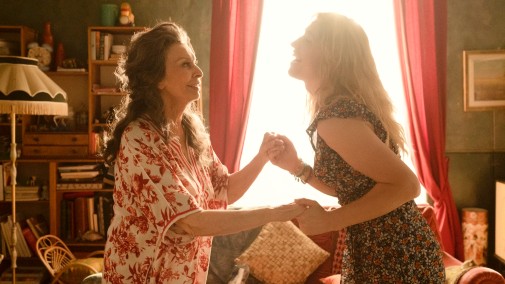
As a great fan of Loren, I was delighted by the chance of seeing the 86-year-old star gracing the screens once more. That might make my assertion of her performance slightly suspect, though. On the one hand, there's a feeling of wanting more, more dramatic pyrotechnics and labored emoting. She doesn't merely appear on the screen asking for applause for being alive like some elderly thespians do, but there's little outward spectacle to her acting.
On the other hand, Loren makes a fairly showy character come off as grounded in reality, underplaying some of the juicier bits with astuteness and letting her eyes shine with the lacerating truths the narrative doesn't tackle head-on. Speaking of Loren's eyes, they are miraculous pools of expression, capable of captivating and saying so much with nothing but a lachrymose stare. Seeing her face turn into a portrait of animalistic fear is incredible, be it when catatonic in the rain or fearful of the police.
When she looks at the officers rounding up refugees, a haunting terror flashes as memories blast through Rosa's mind. One can practically see the blue shirts turn brown, remembrance of her days in Auschwitz ravaging its way to the present. Rosa may have survived some of Humanity's greatest evils, but, like Momo, she carries the scars of the past. Other interesting choices of the actress correlate to this canny underplaying of a meaty part.
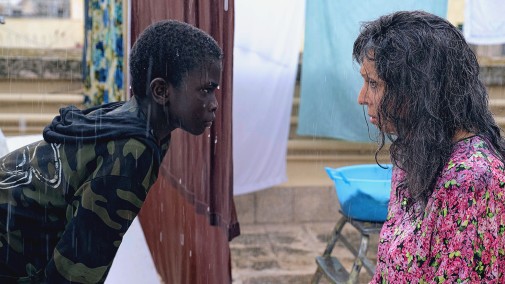
As life reaches its end, the worst parts of it come flushing back like a tidal wave of pain. Still, they bring sweet nostalgia interlaced with the ghosts of suffering. Loren knows this and she makes Rosa come alive when talking about the Holocaust. If only for a moment, her stern demeanor gives way to green vitality, a soft aura of nostalgia sets in when thoughts of a lost family enter her head. It's touching, dancing on the edge of maudlin though never falling into the dark pit.
Loren and Gueye elevate this mediocre affair with plenty of good intentions but little in the ways of cinematic inspiration. As Diane Warren's latest tune sounds over the end credits, many will be drying their teary eyes due to the heartbreaking beauty of those two performances.
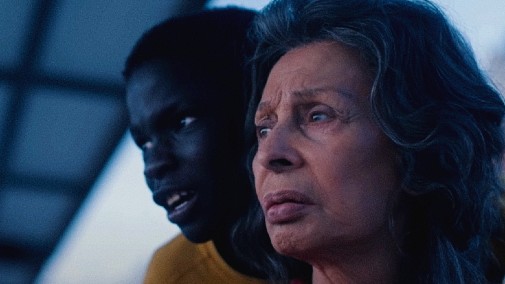
The Life Ahead is now streaming on Netflix.



Reader Comments (19)
A song from Diane Warren? Ugh... can they get someone who can at least write something decent for a change?
It's so nice to see Sophia Loren on screen after all those years. It's a wonderful performance but not worthy of an Oscar nomination. Her co-star is a revelation and will without a doubt win many breakthrough and newcomer awards.
Diane Warren's attempt to get an Oscar has become pitiful. Especially since every new attempt is more desperate and more mediocre than the previous one. The fact that they placed the song right in the finale and before the credits start rolling does not help either, it shouts "Listen to me, i am a masterpiece".
Manolis: If she couldn't win for Don't Wanna Miss a Thing (both probably her best offering for Original Song AND a #1 hit single in the US), it should have become pretty clear to everyone around her she was NEVER going to win.
Always wondered why they gave Loren an honorary Oscar so early (nearly 30 years ago, when she was only in her mid-50s), when almost everyone else gets them when they're 80+.
She is great in the film and deseves an Oscar nomination.
Sorry but this insn't Naples, it's Bari!
Partially why she received an honorary is because she didn't attend the ceremony where she won.
I've seen the play several times for professional reasons, I know it by heart, and I must say that I'm beyond surprised by this adaptation. Conti has left out all the juicy monologues and tearful scenes that Madame Rosa has and that could have led Loren to an Oscar nomination, even a win. All of them. It's all eyes and silences now. Ballsy. I don't think she has an Oscar clip, but what a beautiful way of ending a glorious career.
Didn't like the film, but agree about Loren. It's a lovely performance. Won't be devastated if she misses, but its certainly worthy.
Manolis -- I also don' think Loren is necessarily Oscar-worthy in this. Still, she'd be a better nominee than many recent examples.
Boy from Bari -- Other publications, like The Guardian, said it's Naples but I'll trust you on this. I've changed the first paragraph to be less specific. Thanks for the feedback.
It is definitely Bari. The film was funded by the Apulia Film Commission and Bari is the capital of that region of Italy. More importantly, I know it is Bari because I lived in the neighborhood where it was filmed. You do well to trust Boy from Bari. ;-)
I wish Netflix had made the default language the original Italian. Loren dubbed her role in English, and she does the best dubbing in the film. That said, her performance in Italian is so much better. I hope Academy voters watch the original and wish I had known it was available by adjusting the audio options. BRAVISSIMA!
Very good performances, and as you mention, mediocre material. I also agree I don't need to see either get nominated. The song is lovely, and they were smart to put up the subtitles. If this is Diane Warren's win (finally), I'm cool with it.
Sophia Loren is one of the most expressive actresses ever. She really makes me cry... Two Women, Sunflower, A Very Special Day. Marion Cotillard and Penelope Cruz do the same for me.
As a long-time admirer of Sophia Loren, I had been anxiously awaiting the Netflix premiere. On an up-note, La Loren evokes emotion like no other. The fact that her son, Eduardo, and his mom lovingly created this together touched my heart. However, sadly, I was disappointed on 2 accounts: the distracting and unrealistic dubbed voiceover completely ruined it for me and the screenplay was choppy and under-developed. I think the film could have been so much more, but nonetheless, applaud Soohia Loren for giving us a golden opportunity to see her as an older actor in all her beauty and raw emotion.
Reading some of these comments, I think I should specify that I watched the film in the original Italian - no dubbing involved - with Portuguese subtitles. This review is based on that version of the picture, not the English-dubbed one a few of you have mentioned.
As always, thanks for the feedback. It's always appreciated.
Although the young Momo really steals the show, Sophia Loren brings the whole thing to another level. Her eyes, her expression, such a commanding performance. She is truly mesmerizing. If Emma Stone got an Academy Award in La La Land, then Sophia Loren deserves it hands down.
HORRIBLE DUBBING makes this film unwatchable. Thank you to
the commentator who advises that we can set
the film to the original Italian- I will hope that I can do
that!
The dubbing in Netflix can be changed in audio. I couldn't stand watching it dubbed and realized I could change it to Italian. Netflix is planning on ruining more movies with dubbing, so remember you can change it in audio. If I had not been able to change, I would not have been able to finish the movie. Dubbing is horrible!!!!